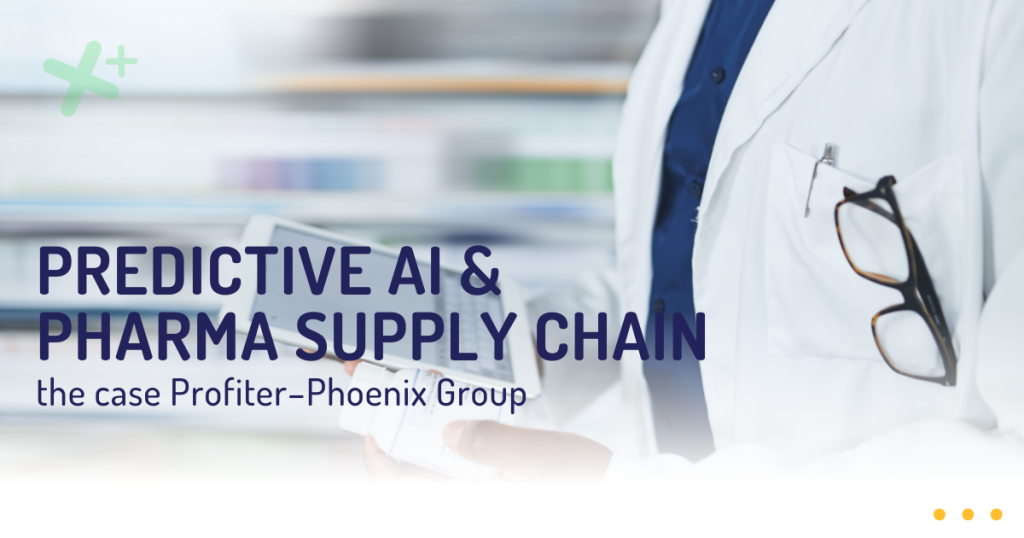
Everyone talks about AI. And when it creates measurable value…
… people talk about it even more
Artificial Intelligence is discussed daily, on social media, at conferences, in white papers.
But when AI truly delivers measurable impact and tangible economic results, in euros, not buzzwords, the conversation reaches another level.
That’s exactly what happened with the joint project between Profiter and Phoenix Pharma Italia.
AI and the Pharmaceutical Supply Chain: a concrete Case Study
Over the course of a year (June 2024 – June 2025), the two companies conducted a scientific benchmarking exercise on demand forecasting models in pharmaceutical distribution. The goal: to compare the performance of Profiter’s AI model against Phoenix’s internal forecasting system, across more than 1,000 pharmaceutical SKUs.
The results were significant:
- Improved accuracy in 64% of cases using the WMAPE comparison method
- Average reduction in logistics costs of 7.9% across 819 SKUs
- Annual savings calculated by the client at over €911,000, based on a total of 28,000 SKUs
This experiment demonstrated how predictive AI in pharmaceutical logistics can generate real economic value, thanks to harmonized data, transparent algorithms, and objective measurements.
Press coverage worth (sometimes) more than a thousand slides
The project’s value was recognized not only by analysts and supply chain stakeholders, but also by the media.
Several leading publications in the pharmaceutical, healthcare, and innovation sectors dedicated articles and in-depth features to our case.
Each with a different angle, confirming the cross-cutting economic, strategic, and operational interest sparked by a project designed to deliver real value in demand management and intelligent forecasting within the pharmaceutical industry.
As featured in
- Pharmacy Scanner
“Advanced logistics and AI: Phoenix and Profiter study that measures the difference”
This leading magazine for pharmacists and supply chain managers, with a technical and managerial focus, concentrated on the economic measurement of AI benefits in logistics. The article explores the concept of Total Cost Function and highlights the potential of dynamic pricing as an optimization tool in pharmaceutical distribution.
Full article (in Italian) - Ifarma
“Predictive models: AI enters pharmaceutical distribution”
This independent publication looking toward the future of pharmacy presented an innovation-oriented perspective, framing the trial as a replicable case in other areas of community healthcare, and emphasizing AI’s concrete impact on efficiency and sustainability.
Full article (in Italian) - Impresa Sanità
“Optimizing pharmaceutical demand forecasting with AI”
This portal specializing in healthcare innovation focused on the project’s methodology, underlining its scientific rigor and the importance of the data harmonization protocol, highlighting the model’s scalability and interoperability in broader healthcare logistics contexts.
Full article (in Italian)
Additional coverage in other specialist publications
The Profiter–Phoenix case also caught attention beyond the main trade magazines.
Several media outlets, both specialized in digital healthcare and technological innovation, as well as more generalist business media, featured the project, confirming its wider relevance.
Among them: Sanità Digitale, TecnoMedicina, Unità.TV, Rassegna Business, Technoretail, Farmacia Ospedaliera.
This coverage strengthens the project’s validation from a communication standpoint as well.
When AI is more than just a promise
At a time when Artificial Intelligence is often discussed in abstract or futuristic terms, the Profiter–Phoenix case provides a concrete demonstration of AI’s measurable value in healthcare and pharmaceutical distribution.
The media coverage obtained is not just an indicator of communication success, but also a validation of the methodology and results.
AI: results and recognition
Our project is not just a case study: it’s a replicable best practice demonstrating how AI-based predictive models can help to:
- reduce operating costs
- improve inventory management
- prevent stock-outs
- increase supply chain resilience
